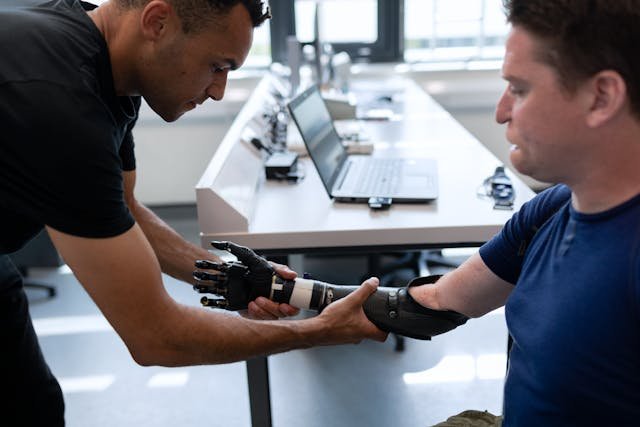For individuals with upper-limb amputations, the ability to move naturally and efficiently is one of the most important factors in choosing a prosthetic limb. Wrist disarticulation prosthetics offer a unique advantage over trans-radial (below-the-elbow) prosthetics by preserving natural forearm rotation. This small but crucial difference allows users to retain a more fluid range of motion, improving functionality and making everyday tasks easier.
Understanding how wrist disarticulation prosthetics preserve forearm rotation can help individuals make informed decisions about their prosthetic options. In this article, we will explore why forearm rotation matters, how wrist disarticulation prosthetics maintain this movement, and why this advantage translates into better usability, comfort, and control for the wearer.
Understanding Forearm Rotation and Its Importance
The human forearm plays a crucial role in daily activities, allowing the hand to rotate and position itself for different tasks. This movement is often taken for granted, but for prosthetic users, it is a key factor in determining how naturally and efficiently they can interact with their environment.
What is Forearm Rotation?
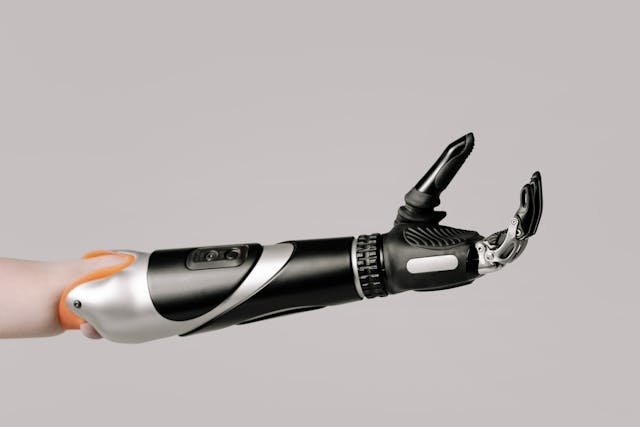
Forearm rotation refers to the ability to turn the palm upward (supination) and downward (pronation). This movement is made possible by the radius and ulna bones, which rotate around each other to adjust the orientation of the hand. Forearm rotation is essential for simple actions like turning a doorknob, holding a cup, or shaking hands.
When forearm rotation is lost, these tasks become more difficult. Instead of naturally rotating the hand, the entire arm or shoulder must compensate, leading to awkward movements and increased strain on other muscles.
How Forearm Rotation Affects Prosthetic Functionality
For individuals with trans-radial amputations, the ability to rotate the forearm is significantly reduced or lost entirely. Since the radius and ulna no longer connect to the hand, prosthetic users must rely on mechanical wrist units or shoulder movement to achieve similar rotation.
However, wrist disarticulation prosthetics allow users to retain full natural forearm rotation. Because the forearm remains intact, users can turn their prosthetic hand naturally without depending on additional mechanisms or exaggerated arm movements.
Why Forearm Rotation is a Game-Changer for Prosthetic Users
The ability to rotate the forearm naturally provides multiple advantages for prosthetic users. It allows for smoother, more intuitive movements, reducing the need for excessive shoulder compensation. This leads to greater efficiency in tasks such as eating, writing, or using a smartphone.
By preserving forearm rotation, wrist disarticulation prosthetics make daily activities more effortless, allowing users to maintain a more natural and comfortable posture throughout the day.
How Wrist Disarticulation Prosthetics Preserve Natural Movement
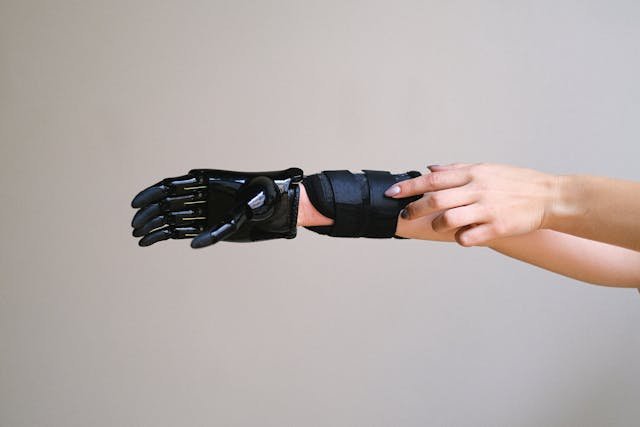
Wrist disarticulation prosthetics are designed to take advantage of the full-length forearm, ensuring that users can rotate their prosthetic hand without relying on additional mechanical components.
Retention of the Full Forearm Structure
One of the primary reasons wrist disarticulation prosthetics maintain forearm rotation is that the radius and ulna remain intact. Since these bones are responsible for natural pronation and supination, their presence allows the residual limb to move in the same way as a fully intact arm.
By preserving this structure, users can rotate their prosthetic hand by simply moving their forearm, rather than having to reposition their shoulder or adjust their entire arm. This makes prosthetic use feel more natural and intuitive.
Direct Connection to the Residual Limb
Unlike trans-radial prosthetics, which require additional suspension systems to secure the socket, wrist disarticulation prosthetics provide a more stable and direct connection to the residual limb. This firm attachment enhances control, allowing users to rotate their prosthetic with greater accuracy and confidence.
Because the prosthetic is securely fitted to the remaining forearm, there is less movement or shifting within the socket. This stability ensures that forearm rotation is transferred smoothly to the prosthetic hand, making it easier to perform delicate tasks.
Improved Weight Distribution and Balance
The presence of a full-length forearm also helps with weight distribution, making wrist disarticulation prosthetics more balanced and comfortable. Since the forearm serves as a counterweight, the prosthetic hand does not feel as heavy or awkward, reducing strain on the residual limb.
With better weight distribution, users can move their prosthetic with greater ease, further enhancing their ability to rotate the forearm naturally. This improved balance also reduces fatigue, allowing users to wear their prosthetic for extended periods without discomfort.
Practical Benefits of Forearm Rotation in Daily Life
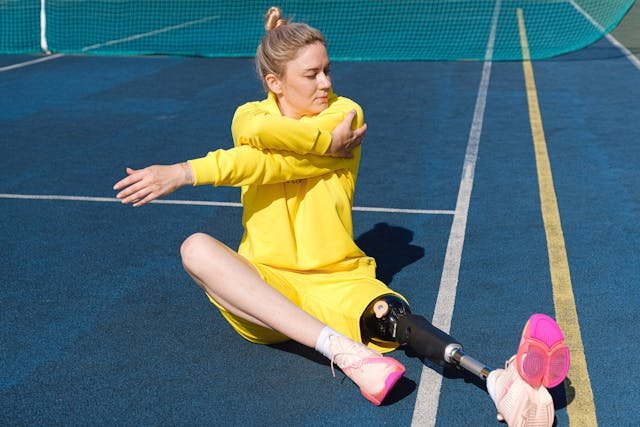
The ability to rotate the forearm naturally has significant real-world benefits, making common tasks easier and more efficient.
Better Control Over Gripping and Manipulation
When forearm rotation is preserved, users can position their prosthetic hand more accurately for gripping objects. This is particularly useful in situations that require wrist flexibility, such as turning a screwdriver, using a fork, or holding a pen.
Without forearm rotation, users must rely on shoulder or elbow movements to adjust the position of their prosthetic hand. This can lead to awkward postures and reduced efficiency, making tasks more physically demanding.
By allowing for natural rotation, wrist disarticulation prosthetics enable smoother and more coordinated hand movements, improving overall dexterity.
Easier Interaction with Objects in Different Orientations
Many everyday objects require forearm rotation for proper interaction. Opening a bottle, using a computer mouse, or grasping a phone all require fine control over wrist position.
With a wrist disarticulation prosthetic, users can perform these tasks more naturally, without needing to rotate their entire arm. This makes movements more fluid and reduces strain on surrounding joints.
For example, instead of repositioning the entire arm to turn a page in a book, a wrist disarticulation prosthetic user can simply rotate their prosthetic hand in place, making the action faster and more comfortable.
More Natural Movements in Social and Professional Settings
The ability to rotate the forearm naturally also has social and professional benefits. Gestures like waving, shaking hands, or gesturing while speaking feel more natural and confident when forearm rotation is preserved.
In professional environments, where handshakes and subtle hand movements are part of daily interactions, the ability to move naturally can make a big difference in how a prosthetic user is perceived. It helps create a sense of ease and normalcy, reducing self-consciousness and making interactions feel smoother.
Choosing the Right Wrist Disarticulation Prosthetic for Maximum Forearm Rotation
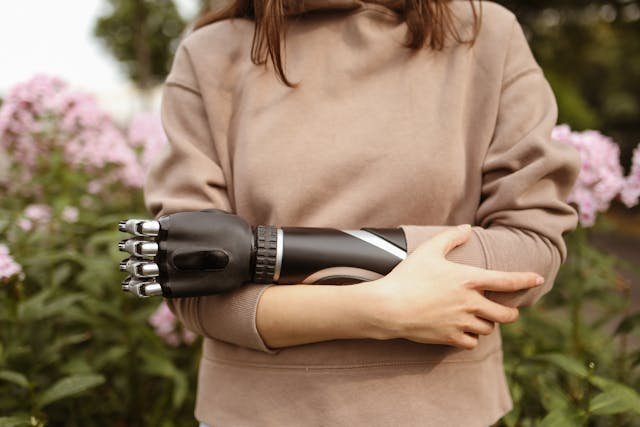
While wrist disarticulation prosthetics inherently preserve forearm rotation, selecting the right prosthetic hand can further enhance this advantage. Different designs, control mechanisms, and customization options play a role in determining how effectively a user can move their prosthetic hand. Understanding these factors helps ensure a better fit and optimal performance.
Types of Wrist Disarticulation Prosthetics
There are various types of wrist disarticulation prosthetics, each offering different levels of functionality based on the user’s needs and lifestyle. The choice depends on factors such as the required range of motion, control system preferences, and activity level.
- Body-Powered Prosthetics: These prosthetics use a harness and cable system to allow users to control hand movements using shoulder and upper-arm motions. While durable and lightweight, they provide limited grip options. However, they do not interfere with forearm rotation, making them a practical choice for users who prioritize strength and reliability.
- Myoelectric Prosthetics: These advanced prosthetics use muscle signals from the residual limb to control hand movements. They offer more natural and precise control, allowing users to rotate their forearm effortlessly while switching between different grip patterns. Myoelectric hands are ideal for individuals who need versatility in daily tasks.
- Hybrid Prosthetics: Combining elements of both body-powered and myoelectric systems, hybrid prosthetics provide users with a balance of durability and advanced control. These prosthetics allow for greater flexibility in movement, ensuring that forearm rotation remains smooth and efficient.
The right type of prosthetic depends on the user’s personal needs, budget, and level of activity. Consulting with a prosthetist ensures that the selected device aligns with lifestyle requirements and long-term comfort.
Key Features to Look for in a Wrist Disarticulation Prosthetic
When selecting a wrist disarticulation prosthetic, several key features can enhance the experience and maximize the benefits of natural forearm rotation.
- Rotating Wrist Unit: Some prosthetic hands come with built-in wrist rotation mechanisms, allowing users to fine-tune their hand positioning further. While wrist disarticulation prosthetics already preserve natural rotation, having an additional mechanical rotation feature can enhance dexterity, particularly for precision tasks.
- Lightweight Materials: Since wrist disarticulation prosthetics are attached to a full-length forearm, selecting a lightweight design prevents excessive strain on the residual limb. Advanced materials like carbon fiber and titanium provide strength without adding unnecessary weight.
- Multiple Grip Patterns: Myoelectric hands with multi-grip functionality allow users to perform a wider range of tasks. Features like a power grip, pinch grip, and lateral pinch improve adaptability, making it easier to grasp objects in different orientations.
- Custom-Fit Socket: The socket is the connection point between the prosthetic and the residual limb. A well-fitted socket ensures stability and comfort while maximizing the effectiveness of forearm rotation. Custom-molded sockets reduce friction, preventing discomfort and pressure sores.
Selecting a prosthetic with these features helps ensure that the natural advantages of wrist disarticulation are fully utilized.
The Importance of Professional Fitting and Training
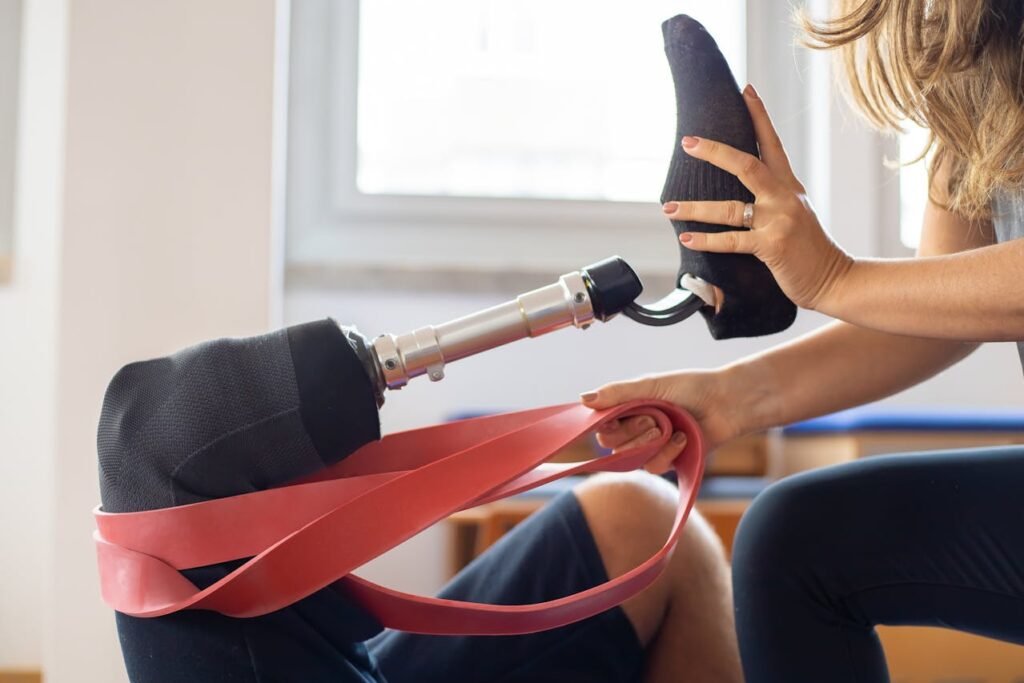
Even with the best prosthetic technology, proper fitting and training are essential for maximizing functionality. A prosthetist plays a crucial role in ensuring that the device fits securely and aligns with the user’s natural movements.
Training sessions help users develop confidence in controlling their prosthetic hand, especially if they are using a myoelectric system. Muscle control exercises, fine motor skill development, and daily activity practice all contribute to a smoother transition into prosthetic use.
At Robobionics, we provide expert fitting and personalized training programs to help users fully harness the benefits of wrist disarticulation prosthetics. With professional guidance and advanced technology, prosthetic users can experience the full potential of forearm rotation and regain independence in their daily lives.
Overcoming Challenges and Adjusting to a Wrist Disarticulation Prosthetic
While wrist disarticulation prosthetics offer significant advantages—especially in preserving forearm rotation—adjusting to a new prosthetic still comes with challenges. Understanding these challenges and how to overcome them can help users transition smoothly and fully integrate their prosthetic into daily life.
Initial Adjustment Period: Getting Used to the Prosthetic
For new prosthetic users, the first few weeks of wearing a wrist disarticulation prosthetic can feel unfamiliar. Even though the residual limb retains forearm rotation, using a prosthetic requires training, patience, and adaptation.
One of the first things users notice is the difference in weight and balance. Since wrist disarticulation prosthetics preserve the full-length forearm, they may feel slightly longer or heavier than expected. However, with time, the body naturally adjusts to the weight, and movements become more instinctive.
Regular practice with simple tasks—such as gripping objects, rotating the wrist, or adjusting grip strength—helps build confidence. Many users also benefit from rehabilitation exercises designed to strengthen the forearm muscles that control the prosthetic.
Fine-Tuning Grip and Dexterity
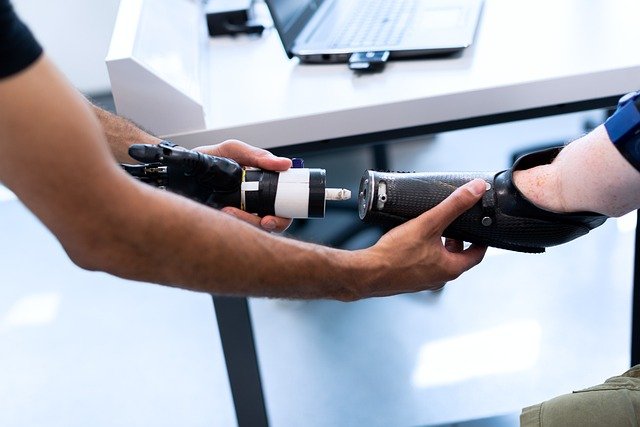
Even though wrist disarticulation prosthetics allow for natural forearm rotation, fine motor skills still require practice. Depending on the type of prosthetic, users must learn how to adjust grip strength, switch between different hand positions, and perform tasks that require wrist stability.
For those using myoelectric prosthetics, training focuses on mastering muscle signals to control the prosthetic’s movements. At first, users may find it difficult to switch between grip patterns or rotate the prosthetic hand with precision. However, with muscle memory training and guided rehabilitation, these actions become more natural over time.
Body-powered prosthetic users, on the other hand, need to focus on harness control. Learning how to generate the right amount of force using shoulder or upper-arm movements helps improve efficiency and reduce fatigue.
To accelerate the adjustment process, many prosthetists recommend task-specific training, where users practice real-life activities such as writing, eating, or using tools. This type of training helps users become more comfortable with their prosthetic in everyday scenarios.
Dealing with Comfort and Fit Issues
A well-fitted prosthetic is crucial for comfort and long-term wearability. Since wrist disarticulation prosthetics connect directly to the forearm, a poorly fitted socket can cause pressure points, skin irritation, or discomfort.
Users should work closely with their prosthetist to ensure that the socket provides a snug yet comfortable fit. Some common adjustments include:
- Adding soft liners to improve cushioning and reduce friction.
- Using vacuum suspension systems to create a more secure connection between the prosthetic and residual limb.
- Regular socket adjustments to accommodate changes in limb shape over time.
It’s also important to take breaks when necessary. If discomfort occurs after extended wear, resting the limb and performing light stretching exercises can help reduce strain.
At Robobionics, we provide personalized fitting services to ensure that each user receives a comfortable, custom-made socket that enhances prosthetic usability. Our team also offers follow-up support to help users make necessary adjustments for long-term comfort.
Conclusion: The Advantage of Wrist Disarticulation Prosthetics
Wrist disarticulation prosthetics offer a key advantage over other upper-limb prosthetics by preserving natural forearm rotation. This retained movement allows users to perform daily tasks with greater ease, control, and confidence. From gripping objects more effectively to interacting naturally in social settings, the benefits of forearm rotation make a significant impact on prosthetic usability.
At Robobionics, we specialize in designing advanced wrist disarticulation prosthetics that maximize comfort, function, and mobility. If you are exploring prosthetic options and want to experience the benefits of forearm rotation, contact us today for a personalized consultation. Let us help you find a prosthetic solution that enhances your independence and restores natural movement.



